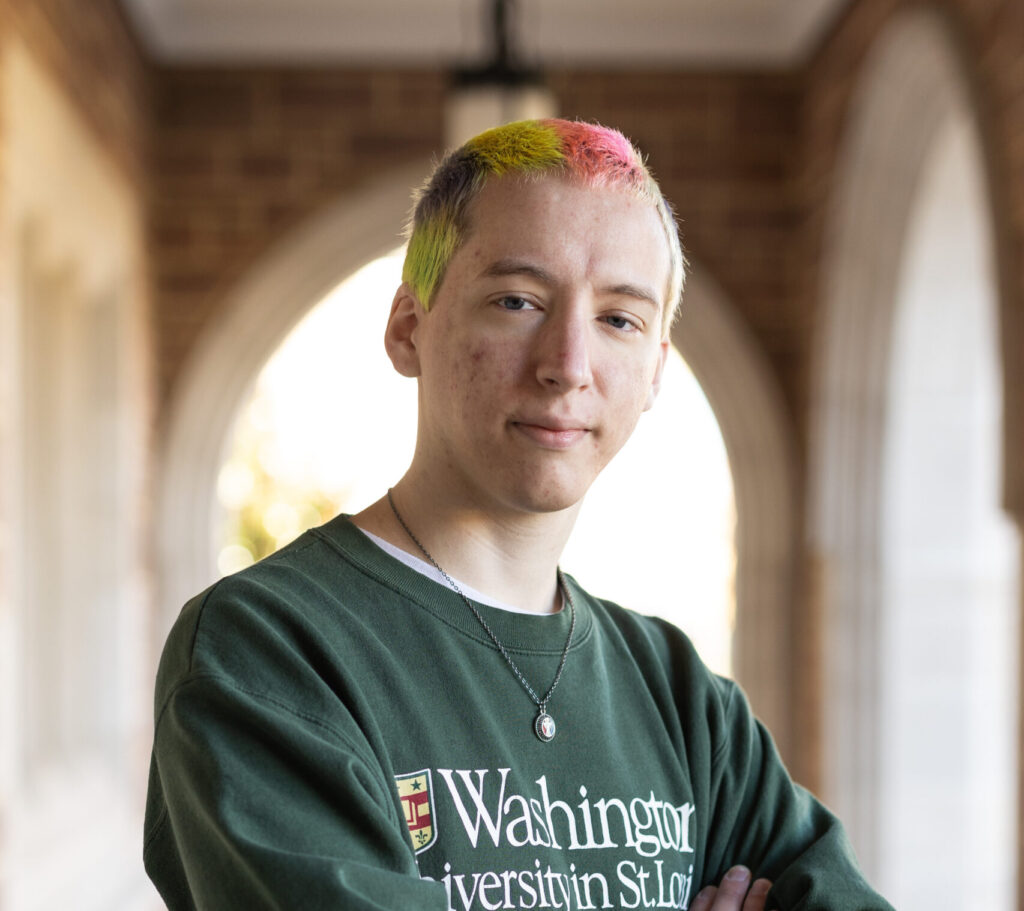When senior Nash Overfield was a first-year student, he dominated at the icebreaker Two Truths and a Lie because his peers never guessed he hadn’t been outside of the United States.
“It was inconceivable to them that I’d never been abroad,” said Overfield. “But I didn’t grow up with those opportunities because my family simply couldn’t afford those kinds of things.”
Overfield is a part of a growing number of students at WashU who are first-generation, limited-income (FGLI), and while he is extraordinarily grateful to be studying at WashU, through the WashU Pledge, he says there are distinct challenges only known to FGLI students on campus.
“The biggest barrier we face as FGLI students is cultural,” he said. “Every single FGLI student has a story like mine about the icebreaker. For a lot of students who go here, there is a lack of understanding and ability to relate to people who come from a place of scarcity because they’ve never experienced it.”
For a lot of students who go here, there is a lack of understanding and ability to relate to people who come from a place of scarcity because they’ve never experienced it.
That’s why Overfield has taken on an advocacy role for FGLI students during his time on campus.
“The university has done amazing things. I will not say the university hasn’t done anything to make a difference to bring about a more socioeconomically diverse student body,” he said. “It’s incredible – lifechanging – to be receiving a couple hundred thousand dollars in scholarship. That said, the structures and systems in place are not necessarily made for students like me. So, the establishment of the Taylor Stars program is huge, and it’s made all the difference in the world, genuinely.”
Housed in the Taylor Family Center for Student Success, the Taylor Stars program creates an infrastructure of support to assist FGLI undergraduate students with their transition to and through college. As part of that support system, Overfield both worked with and later became a peer mentor. Through that experience, he said the Taylor Family Center for Student Success has become the most impactful resource for him while at WashU.
“My time as a mentor was incredibly meaningful,” he said. “I got to work with first year students who were in the same kind of situation as me – coming to WashU from an FGLI background, and holy cow, it’s very intimidating, very disorienting. So, I was compelled to help and do what I could to ensure my fellow FGLI students succeeded while at WashU.”
Overfield said that while most all WashU students face overwhelm and stress due to the academic rigor of the institution, it’s especially high for FGLI students.
“Burnout is very much part of the student experience, but it seems especially acute for FGLI students because [studying at WashU] is the opportunity of a lifetime, and if you mess it up or you don’t work your hardest, or if you don’t take advantage of every single opportunity possible, then you’re wasting more than a quarter of a million-dollar opportunity. So, there is almost a moral imperative to do all that you can. When you have grown up knowing that resources are scarce and you come to a place where they are essentially infinite, you’ve got to do everything you can to succeed. It can create a lot of pressure and stress, absolutely.”
Burnout is very much part of the student experience, but it seems especially acute for FGLI students because [studying at WashU] is the opportunity of a lifetime, and if you mess it up or you don’t work your hardest, or if you don’t take advantage of every single opportunity possible, then you’re wasting more than a quarter of a million-dollar opportunity.
Overfield will graduate in Spring 2024 with a major in African & African American Studies and a minor in Women, Gender, and Sexuality Studies. Now though, if ever presented with the same icebreaker from his first year, he will have to come up with a different lie. That’s because while at WashU, he’s traveled to and conducted research not only in the United States, but in Kenya, the Netherlands, and the United Kingdom.
“I’ve discovered that historical research is my academic passion,” said Overfield. “Had it not been for my professor who asked me if I wanted to go to Kenya to do research, I wouldn’t have even known that an undergraduate student could do historical research, much less travel for it and have it funded. It’s just an added bonus that I can now say I too have been abroad.”
